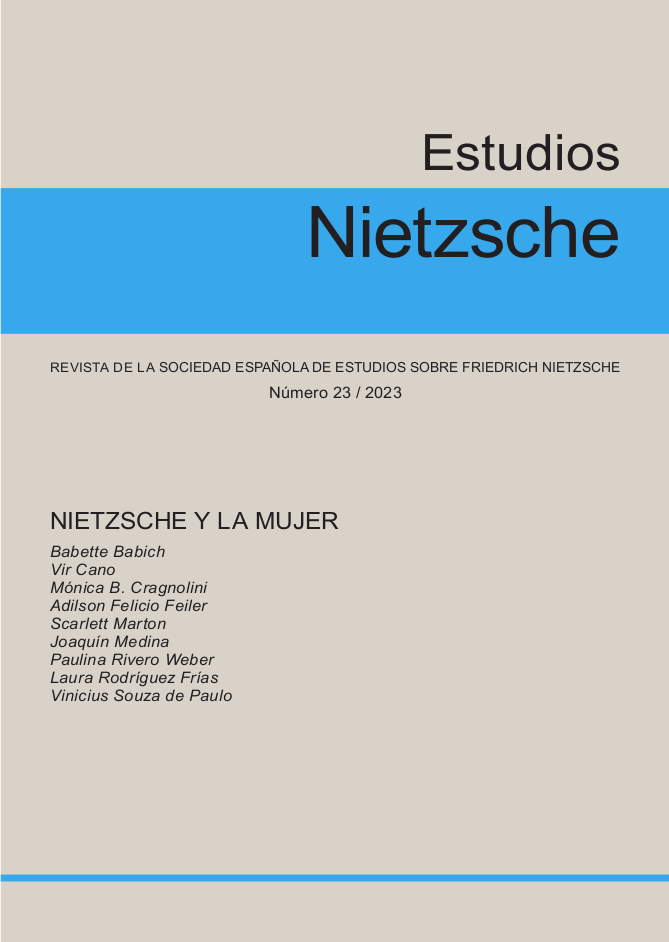Rapture and drunkenness: the feeling of fullness.
From losing the external senses of Teresa of Avila to the increase of the instincts in Nietzsche
DOI:
https://doi.org/10.24310/EstudiosNIETen.vi23.15678Keywords:
Nietzsche, Teresa of Ávila, Rapture, FullnessAbstract
Abstract: Teresa of Avila presents the mystical rapture, the supreme expression of ecstasy, as the absence of the exterior senses, and, with it, of all disturbance. This spiritual experience results from a clairvoyant truth, acquired beyond the understanding as a unique and singular moment. Therefore, it is the experience that takes place in an instant of fullness, in an instant that is, at the same time, full and empty. On the paths of the experience of fullness, Nietzsche expresses it as intoxications, as that moment of culmination, of instinctual increase. However, while it consists of an experience of a maximum increase of instincts, it reveals itself as an absence, like nothing, with no goal to reach. In this sense, both in the mystical rapture and the Dionysian intoxication there is a feeling of fullness that is expressed, at the same time that it gains fulfillment, an increase as well as loss, absence, and emptiness. So, to what extent is it possible to observe, in addition to distances to rapture and drunkenness, also overlaps and even identities? Is the experience of fullness something common around Teresa of Avila’s rapture and Nietzsche’s drunkenness?
Downloads
Metrics
References
Abel, Günter, Nietzsche: Die Dynamikder Willenzur Macht und die ewige Wiederkehr. Berlin, 1984.
Avila, Teresa of: The complete works St Tereza of Avila, Translated by Edgar Allison Peer’s, New York: Continnum-3PL, 2004)
Bamony, Pierre, “Amour mystique et sensualité triviale: une interprétation de l’expérence spirituelle de Sainte Thérèse d’Avila et de Saint Jean de la Croix, mystiques espagnols selon la philosophie nietzschéenne”, in: Sciences – Cerveau – Transversalité des Savoirs Humains, 20 mars, Paris, 2014.
Charlton, James Martin, “A Desire for Immersion: The Panorama to the Oculus Rift”, in: 24th International Panorama Conference 2015, Belgium: Namur, 2015, S. 9-12.
Chatenieu, Marc: Nietzsche Vision: Die Demokratie am Galgen. Die Übersetzung der Schriften Nietzsche in die Sprache und das Wissen der Gegenwart. Teil 2 Vom Willen zur Macht, Berlin: Verlag 2013.
Clark, Maudemarie: Nietzsche on truth philosophy, Cambridge: Cambridge University Press, 1990.
Hatab, Lawrence: A Nietzschean Defense of Democracy: An Experiment in Postmodern Politics, Chicago: Open Court,1995.
Kaufmann, Walter, Nietzsche: Philosopher, Psychologist, Antichrist, Princeton,1950.
Knoll, Manuel, „Nietzsches Radikalismus. Seine Konzeption des Menschen, der Verteilungsgerechtigkeit und des Staates“, in: Hans-Martin Schönherr-Mann (Hrsg.), Der Wille zur Macht und die,große Politik‘ (Baden-Baden 2010), S. 35–67.
Krummel, Richard Frank: Nietzsche und der deutsche Geist. Bd. 1/3. Berlin: Walter de Gruyter, 1998.
Leiter, Brian: Nietzsche on morality, London: Routledge, 2002.
Nietzsche, Friedrich Wilhelm: Kritische Studienausgabe. Herausgegeben von Giorgio Colli und Mazzino Montinari, 15 Bd, Berlin: Verlag de Gruyter, 1999.
Nietzsche, Friedrich Wilhelm: Sämtliche Briefe: Kritische Gesamtausgabe Briefwechsel KGB. Herausgegeben von Georgio Colli und Mazzino Montinari, 8 Bd, Berlin: Walter de Gruyter, 1986.
Nietzsche, Friedrich Wilhelm. The complete works of Friedrich Nietzsche, Translated by Richerd T. Gray, 19 vol., Redwood City: Stanford University Press, 1995.
Nietzsche, Friedrich Wilhem: Selected letters of Friedrich Nietzsche, Edited and translated by Christopher Middleton, Chicago: University of Chicado Press, 1969.
Shapiro, Gary: Nietzsche’s Earth. Great Events, Great Politics, Chicago/London, 2016.
Small, Robin: Nietzsche in Context, Basingstoke, 2002.
Small, Robin: Time and Becoming in Nietzsche’s Thought, London, 2010.
Urpeth, Jim, “Reviving ‘Natural Religion’: Nietzsche and Bergson on Religious Life”, in: Nietzsche and Phenomenology, Ed. A. Rehberg, Newcastle upon Tine: Cambridge: Cambridge Scholars Press, 2011, S. 185-206.
Urpeth, Jim, “Immanence and the sacred in Bataille’s on Nietzsche”, in: Bataille’s Nietzsche, 10-11th November 2016, Centre for Philosophy and Critical Thought, Goldsmiths’ London: College –University of London, 2016.
Whitlock, Gregory, “Roger Boscovich, Benedict de Spinoza, and Friedrich Nietzsche: The Untold Story”, Nietzsche-Studien 25 (1996), 200–20.
Downloads
Published
How to Cite
Issue
Section
License
As of issue 21 (2021) this journal is published only in open access (diamond route).
From that number 21, like the previous numbers published in NIETZSCHE STUDIES, they are subject to the Creative Commons Acknowledgment-NoComercia-ShareIgual 4.0 license, the full text of which can be consulted at <http://creativecommons.org/licenses/by-nc-sa/4.0 >
It is the responsibility of the authors to obtain the necessary permissions of the images that are subject to copyright.
This work is licensed under a Creative Commons Attribution-NonCommercial-ShareAlike 4.0 International License.
Copyright generates two different rights: moral rights and patrimonial rights that EJFB recognizes and respects. Moral rights are those relating to the recognition of the authorship. They are rights of a personal nature that are perpetual, inalienable, unseizable and imprescriptible as consequence of the indivisible union of the author and his/her work.
Patrimonial rights are those that can be derived from the reproduction, distribution, adaptation or communication of the work, among others.







11.png)
